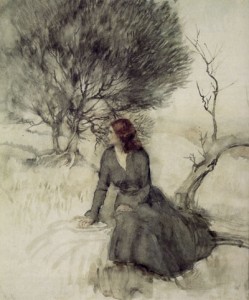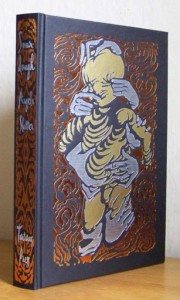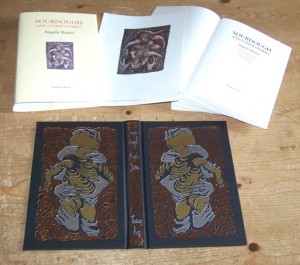
Arthur Rackham, Girl Beside a Stream
Oh noes! Second last Sourdough story! Soon it will all be over. 🙁
With “Lavender and Lychgates” I wanted to draw some threads together: I wanted to see Emmeline and Peregrine from “Sourdough” in their later life together – I wanted to know they were happy. I wanted to add another dimension to Emmeline’s mother, and I realised she was one of the twins from “The Angel Wood”, all grown up and with a family and personality of her own. I wanted to continue the idea of the importance of books in this collection, and of Lodellan as a place where books were born – that, in addition to its degenerate places, it also produced some wonderful things. Sidenote: the Carabhilles who own one of the bookstores in Lodellan have gone on to appear in The Bitterwood Bible and the new novella I’m working on, The Witch’s Scale.
I wanted to continue to explore concepts about the consequences of Emmeline’s actions in “Sourdough”. I had an image in my head of a young girl playing in a graveyard, which managed to entwine itself with a garbled tale of lilacs and lychgates a friend had told me years ago, the precise details of which I cannot remember. I managed to garbled it even more, replacing lilacs with lavender. I couldn’t get the words ‘lavender and lychgates’ out of my head, nor the image of shadows swirling in the apex of a lychgate roof above the heads of people passing out underneath. Emmeline ends “Sourdough” with the words ‘My memory is true’, and I wondered what happens when you hang onto a recollection too tightly.
This story was chosen by Stephen Jones for The Mammoth Book of Best New Horror 22.
Lavender and Lychgates [extract]
My mother’s hair catches the last rays of the afternoon sun and burns. My own is darker, like my father’s, but in some lights you can see echoes of Emmeline’s bright fire buried deep.
She leans over the grave, brushing leaves, dirt and other wind-blown detritus away from the grey granite slab. A rosebush has been trained over the stone cross, and its white blooms are still tightly curled, with just the edges of the petals beginning to unfurl. Thomas Austen has rested here for fifteen years. Today would have been my brother’s birthday
To our right is one wall of the Cathedral, its length interrupted by impressive stained-glass windows that filter light and drop colours onto the worshippers within. My father, Grandma Tildy and my twin brothers, Henry and Jacoby, are among them, listening to the intoning of the mass. I can hear the service and the hymns as a kind of murmur through the thick stones. Emmeline has refused to set foot in there since Thomas’s untimely demise. I used to attend, too, but only until I was three or so, when I made plain my preference for my mother’s company over one of the hard-cushioned pews. Peregrine gave up arguing about it long ago, so I’ve been perched on the edge of Micah Bartleby’s tomb, weaving a wreath. I braid in lengths of lavender to add colour. I put the finished item beside my mother and tap her on the shoulder to draw her attention.
‘Thank you, sweetheart,’ she says, voice musical. Her face is smooth and her skin pale; only the flame-shaped streak of white at her widow’s peak shows that she’s older than you might think. Her figure remains trim and she still catches my father’s eye. ‘Don’t go too far, Rosie.’ 
She says this every time even though she knows the graveyard is my playground. When I was smaller, Emmeline would not let me wander on my own. She knew – knows – that things waited in the shadows, bright-eyed and hungry-souled. Now I am older she worries less for I’m aware of the dangers. Besides, the dark residents here want only to steal little children – they are easier to carry away, sweeter to the taste. She believes I am safe. I drop a kiss on the top of her head, feel how warm the sun has made her hair. She smells of strawberries.
I take my usual route, starting at Hepsibah Ballantyne, ages dead and her weeping angel tilted so far that it looks drunk and about to fall over. Under my carefully laced boots crunch the pieces of quartz making up the paths, so white it looks like a twisted spine. Beneath are miles and miles of catacombs, spreading out far beyond the aboveground boundaries of the graveyard. This city is built upon bones.
The cemetery devours three sides of Lodellan Cathedral, only the front entrance is free, its portico facing as it does the major city square. High stone walls run around the perimeter of the churchyard, various randomly located gates offer ingress and egress. The main entrance is a wooden lychgate, which acts as the threshold to the home of those-who-went-before.
No rolling acres of peaceful grass for our dead, but instead a labyrinth, a riotous mix of flora and stone, life and death. There are trees, mainly yew, some oak, lots of thick bushes and shrubs making this place a hide-and-seek haven. It’s quite hard, in parts, to see more than a few feet in front of you. You never know if the path will run out or lead over a patch of ground that looks deceptively firm, but is in fact as soft and friable as a snowdrift. You may find yourself knee-deep in crumbling dirt, your ankles caught in an ancient ribcage or, worse, twenty feet down with no one to haul you back into the air and light.
I am safe from these dangers at least, for I recognise the signs, the way the unreliable earth seems to breathe, just barely.
You might think perhaps that becoming dust would level all citizens, make social competitions null and void, but no. Even here folk vie for status. Inside the Cathedral, in the walls and under the floor, is where our royalty rests – the finest location to wait out the living until the last trumpet sounds. Where my mother sits is the territory of the merchant classes, those able to afford a better kind of headstone and a fully weighted slab to cover the spots where the dearly departed repose.
Further on, the poorer folk have simple graves with tiny white wooden crosses that wind and rain and time will decimate. Occasionally there is nothing more than a large rock to mark that someone lies beneath. In some places sets of small copper bells are hung from overhanging branches – their tinkling plaint seems to sing ‘remember me, remember me’.
Over by the northern wall, in the eastern corner, there are the pits into which the destitute and lost are piled and no one can recognise one body from another. These three excavations are used like fields: two lie fallow while one is planted for a period of two years. Lodellan does not want her dead restless, so over the unused depressions lavender is grown, a sea of purple amongst the varying greens, browns and greys. These plants are meant to cleanse spirits and keep the evil eye at bay, but rumour suggests they are woefully inadequate to the task.
In the western corner are the tombs proper, made from marble rather than granite, these great mausoleums rise over the important (but not royal) dead. Prime ministers and other essential political figures; beloved mistresses sorely missed by rich men; those self-same rich men in neighbouring sepulchres, mouldering beside their ill-contented wives, bones mingling in a way they never had whilst they breathed; parvenus whose wealth opened doors that would otherwise have remained firmly shut; and families of fine and old name, whose resting places reflected their status in life.
My father’s family has one of the largest and most elaborate of these, but he is banned from resting there – as are we. Even after all the scandal with his first wife and the kerfuffle when he set up sinful house with my mother, Peregrine had his own money. His parents saw no point, therefore, in depriving him of an inheritance and left him their considerable fortunes when they died. What they did refuse him was the right to be buried with them. They seemed to think this would upset him most, which caused Peregrine to comment on more than one occasion that it was proof they really had no idea at all.
Once upon a time I liked to play with my dolls in the covered porch that fronts the Austen mausoleum, imagining these grandparents I’d never met. But now I’m older, I don’t trouble with dolls anymore, nor do I concern myself with grands who didn’t care enough to see me when they lived. I feel myself poised for I know not what; that I stand on a brink. Grandma Tildy tells me this is natural for my age. So I simply wait, impatiently. I walk up the mould-streaked white marble steps and sit, staring into the tangled green of the cemetery.
 Across the way a veil of jasmine hangs from a low yew branch, and something else besides. Something shining and shivering in the breeze: a necklace. I leave my spot and move closer to examine it without touching. There’s little finesse in its making, the blue stones with which it is set are roughly cut and older than old. The whole thing looks pretty, but raw. I know not to take it. Corpse-wights set traps for the unwary. There are things here the wise do not touch. Should you find something, a toy, a stray gift that seems lost, do not pick it up thinking to return to it for chances are its owner is already contemplating you from the shadows. There are fetishes, too, made of twigs and flowers, which catch the eye, but nettles folded within will bite. Even the lovely copper bells may be a trick, for many’s the time no one will admit to hanging them.
Across the way a veil of jasmine hangs from a low yew branch, and something else besides. Something shining and shivering in the breeze: a necklace. I leave my spot and move closer to examine it without touching. There’s little finesse in its making, the blue stones with which it is set are roughly cut and older than old. The whole thing looks pretty, but raw. I know not to take it. Corpse-wights set traps for the unwary. There are things here the wise do not touch. Should you find something, a toy, a stray gift that seems lost, do not pick it up thinking to return to it for chances are its owner is already contemplating you from the shadows. There are fetishes, too, made of twigs and flowers, which catch the eye, but nettles folded within will bite. Even the lovely copper bells may be a trick, for many’s the time no one will admit to hanging them.
There’s a rustle in the boughs above me and I see a face, wrinkled and sallow, with yellowed buck teeth, the brightest green eyes and hair that is, in the very few parts that are not white, as fiery as Emmeline’s. The creature seems a “not-quite” – part human, part something else. Troll? My heart stops for a few beats as I stare up at the funny little visage; its gnarled hands hold the leaves back so it may peer at me clearly. Then it tries a smile, a shy strangely lovely expression, which I cannot help but return. I do not think this being is associated with the shiny temptation on the branch below it.
‘Rosie! Rosamund!’ My mother’s shout reaches me. I back away and race through the bone orchard, my feet sure.
Emmeline is standing, stretching her arms up to the sky. In her hand is her sun bonnet, which she wears less than she should, its ribbons fluttering. She smiles to see me. ‘Afternoon service will be finished soon.’
I’m almost there when my foot catches on a tree root I could swear was not in existence a moment before and I fall towards my brother’s grave. My hands hit the rough-polished granite and while one stays put, merely jarring the wrist, the right one skids across the surface, catching on the letters of his name. I feel the skin peel from my palm and let out a squeal of shock and pain. A slew of hide and a scarlet stain mar the stone. The ring my mother gave me, silver vines and flowers all entwined, is embedded into the flesh of my finger and I think I feel it grind against bone. I knock my knees against the sharp edge of the slab, too, ensuring impressive bruises in spite of the padding of my petticoats and skirt.
I may be almost an adult, but for all that I wail like a child while Emmeline fusses about with her lacy handkerchief.
‘Oh, oh, oh, my girl! Come along home, we’ll get those seen too. Your grandma will have something we can put on that.’ She helps me up and dabs at the seeping blood while I howl. My abused flesh stings and burns as we pass out under the lychgate. Shadows crowd above us in the angles of its ornate roof.
As we hobble away, I remember that I forgot to whisper good wishes to my brother.
***

